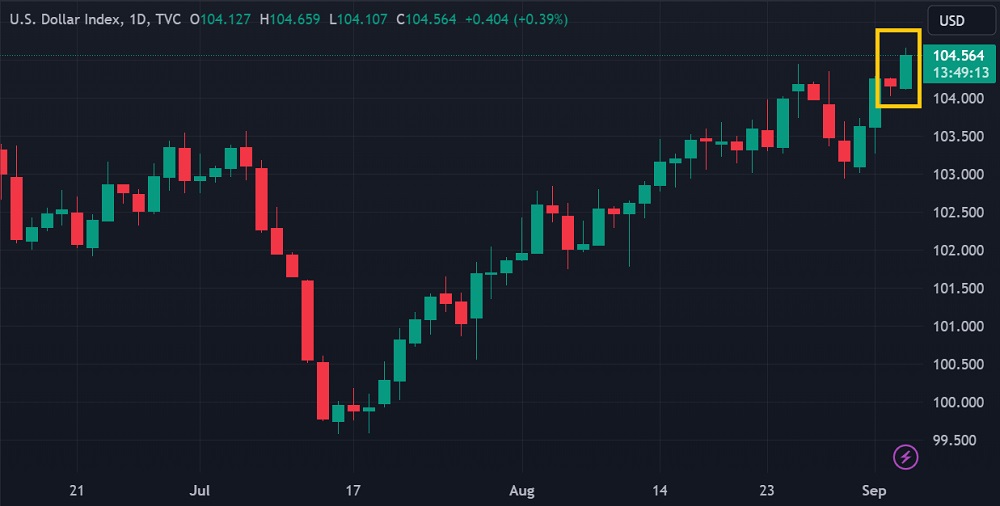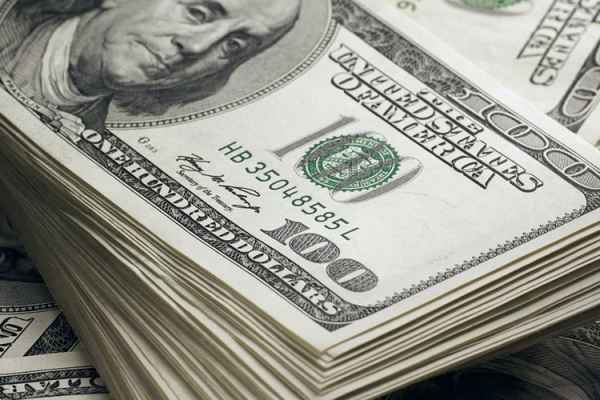The United States data reveals relatively stronger performance compared to the latest global economic news, strengthening the US dollar exchange rate.
Various major currencies weakened as market concerns emerged regarding the global economic outlook following disappointing news releases from Asia, Europe, and Australia on Tuesday, September 5th. The greenback has relatively better prospects, causing the US Dollar Index (DXY) to rise by around 0.4% to the 104.50 range at the beginning of the European session.

This morning, Caixin reported that the Purchasing Managers' Index (PMI) for the services sector in China weakened from 54.1 to 51.8 for the August 2023 period. However, the previous consensus had only expected a slowdown to 53.6.
HCOB/Markit Economics also announced that the Eurozone PMI score experienced a sustained decline. The Eurozone PMI score for the services sector dropped significantly from 50.9 to 47.9 in August 2023. Meanwhile, the composite PMI score fell from 48.6 to 46.7. The separate PMI scores for Germany, France, Italy, and Spain missed market expectations in unison.
All of this data has fueled market concerns about the prospects for global economic growth. On the other hand, the mixed economic data from the US last week now appears more robust. As a result, the US dollar has again taken the lead after being somewhat restrained by Monday's US Labor Day holiday.
EUR/USD declined by approximately 0.4% to around 1.0750, again reaching new lows not seen since June. GBP/USD plummeted by over 0.6% to the range of 1.2545. In contrast, USD/JPY edged higher to reach 147.00.
"The twin drivers of dollar strength of U.S. higher yields and weaker growth conditions out of the U.S. are still in fifth gear," said Simon Harvey, head of FX analysis at Monex Europe.
AUD/USD has become the worst-performing currency pair today. The Aussie tumbled by approximately 1.3% and hit its lowest level at 0.6370 against the greenback. This currency is weighed down by the economic slowdown in China and the Reserve Bank of Australia's (RBA) decision not to raise interest rates earlier this morning.
"The RBA's policy stance overall remains a weight on the Aussie, especially against the U.S. dollar, where the Fed funds rate seems highly likely to remain 125+ basis points above the RBA cash rate deep into 2024," said Westpac analyst Sean Callow.

 Dedicated FREE FOREX VPS
Dedicated FREE FOREX VPS Free FOREX Virtual Private Server
Free FOREX Virtual Private Server MT4 Demo Contest, Get $500
MT4 Demo Contest, Get $500 Sign Up for an Account, Claim 60% Deposit Bonus
Sign Up for an Account, Claim 60% Deposit Bonus Free MT4/MT5 VPS 2024
Free MT4/MT5 VPS 2024 Send E-mail and Get Free Merchandise
Send E-mail and Get Free Merchandise $1K Refer a Friend Bonus for Pepperstone Pro clients
$1K Refer a Friend Bonus for Pepperstone Pro clients Maximize Your Earnings with 100% Deposit bonus
Maximize Your Earnings with 100% Deposit bonus Trade to Win, $5,000 Monthly Demo Contest
Trade to Win, $5,000 Monthly Demo Contest Claim 30% + 15% Deposit Bonus from LiteFinance
Claim 30% + 15% Deposit Bonus from LiteFinance






